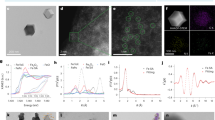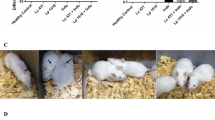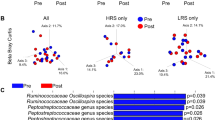Abstract
Zinc deficiency enhances infectious diarrhea whereas probiotics may inhibit pathogen enterocyte invasion. The effect of probiotics on zinc-deficient versus normal human intestinal epithelium (Caco-2 and T-84) with regard to invasion and subsequent inflammatory response by Salmonella typhimurium was determined. Cells were infected with pathogens and preincubated with media conditioned by several lactobacilli or Bifidobacterium bifidum 12. Pathogen invasion was quantified, inflammation was determined by IL-8 secretion, and MAP kinase activation in the epithelium was analyzed. Probiotic inhibiting factors were partially characterized based on physicochemical properties. Zinc deficiency allowed for greater pathogen invasion and enhanced IL-8 secretion. Probiotic conditioned media reduced activation of proinflammatory signaling via the ERK and p38 pathway. Probiotic factors reverse increased susceptibility of zinc-deficient enterocytes to S. typhimurium invasion, suggesting an additive protective effect of probiotics in zinc deficiency. Probiotic conditioned media but not bacteria inhibited pathogen invasion and IL-8 production in zinc deficient enterocytes. Probiotic inhibitory factors are stable to treatment with proteases, deoxyribonucleases (DNAses), ribonucleases (RNAse), strong acid, and heat.
Similar content being viewed by others
Log in or create a free account to read this content
Gain free access to this article, as well as selected content from this journal and more on nature.com
or
Abbreviations
- MRS:
-
Mann Rogosa Sharpe
- PMA:
-
phorbol 12-myristate 13-acetate
References
Fischer Walker C, Black RE 2004 Zinc and the risk for infectious disease. Annu Rev Nutr 24: 255–275
Koren-Michowitz M, Dishy V, Zaidenstein R, Yona O, Berman S, Weissgarten J, Golik A 2005 The effect of losartan and losartan/hydrochlorothiazide fixed-combination on magnesium, zinc, and nitric oxide metabolism in hypertensive patients: a prospective open-label study. Am J Hypertens 18: 358–363
Prasad AS 2001 Recognition of zinc-deficiency syndrome. Nutrition 17: 67–69
Castillo-Duran C, Vial P, Uauy R 1988 Trace mineral balance during acute diarrhea in infants. J Pediatr 113: 452–457
Hoque KM, Binder HJ 2006 Zinc in the treatment of acute diarrhea: current status and assessment. Gastroenterology 130: 2201–2205
Broekaert IJ, Walker WA 2006 Probiotics and chronic disease. J Clin Gastroenterol 40: 270–274
Shi HN, Walker A 2004 Bacterial colonization and the development of intestinal defences. Can J Gastroenterol 18: 493–500
Szajewska H, Mrukowicz JZ 2001 Probiotics in the treatment and prevention of acute infectious diarrhea in infants and children: a systematic review of published randomized, double-blind, placebo-controlled trials. J Pediatr Gastroenterol Nutr 33: S17–S25
Huang JS, Bousvaros A, Lee JW, Diaz A, Davidson EJ 2002 Efficacy of probiotic use in acute diarrhea in children: a meta-analysis. Dig Dis Sci 47: 2625–2634
Bao B, Prasad AS, Beck FW, Godmere M 2003 Zinc modulates mRNA levels of cytokines. Am J Physiol Endocrinol Metab 285: E1095–E1102
Claud EC, Savidge T, Walker WA 2003 Modulation of human intestinal epithelial cell IL-8 secretion by human milk factors. Pediatr Res 53: 419–425
Fusunyan RD, Nanthakumar NN, Baldeon ME, Walker WA 2001 Evidence for an innate immune response in the immature human intestine: toll like receptors on fetal enterocytes. Pediatr Res 49: 589–593
Mengheri E, Nobili F, Vignolini F, Pesenti M, Brandi G, Biavati B 1999 Bifidobacterium animalis protects intestine from damage induced by zinc deficiency in rats. J Nutr 129: 2251–2257
Shamir R, Makhoul IR, Etzioni A, Shehadeh N 2005 Evaluation of a diet containing probiotics and zinc for the treatment of mild diarrheal illness in children younger than one year of age. J Am Coll Nutr 24: 370–375
Huang FC, Werne A, Li Q, Galyov EE, Walker WA, Cherayil BJ 2004 Cooperative Interactions between Flagellin and SopE2 in the epithelial interleukin-8 response to Salmonella enterica Serovar Typhimurium infection. Infect Immun 72: 5052–5062
Nobili F, Vignolini F, Figus E, Mengheri E 1997 Treatment of rats with dexamethasone and thyroxine protects against zinc deficiency-induced intestinal damage. J Nutr 127: 1807–1813
Azriel-Tamir H, Sharir H, Schwartz B, Hershfinkel M 2004 Extracellular zinc triggers ERK-dependent activation of Na+/H+ exchange in colonocytes mediated by the zinc-sensing receptor. J Biol Chem 279: 51804–51816
Park KS, Ahn Y, Kim JA, Yun MS, Seong BL, Choi KY 2002 Extracellular zinc stimulates ERK-dependent activation of p21Cip/WAF1 and inhibits proliferation of colorectal cancer cells. Br J Pharmacol 137: 597–607
Yan F, Polk DB 2002 Probiotic bacterium prevents cytokine-induced apoptosis in intestinal epithelial cells. J Biol Chem 277: 50959–50965
Tao Y, Drabik KA, Waypa TS, Musch MW, Alverdy JC, Schneewind O, Chang EB, Petrof EO 2006 Soluble factors from Lactobacillus GG activate MAPKs and induce cytoprotective heat shock proteins in intestinal epithelial cells. Am J Physiol Cell Physiol 290: C1018–C1030
Acknowledgements
The authors thank Dr. Chitra Amarasiriwardena, Trace-metal Laboratory, Channing Laboratory, Harvard Medical School, Boston, MA, for determining zinc concentrations by ICP-MS (Varian Instruments, Palo Alto, CA).
Author information
Authors and Affiliations
Corresponding author
Additional information
This review was supported by funding from the National Institutes of Health [(PO1 DK33506, P30 DK40561, R37 HD12437 (W.A.W.), ROI DK70260 (W.A.W., N.N.N.)], by a Fulbright Scholarship from the United States Department of State (I.J.B.), and by a research fellowship from Mead Johnson Nutritionals (I.J.B.).
Rights and permissions
About this article
Cite this article
Broekaert, I., Nanthakumar, N. & Walker, W. Secreted Probiotic Factors Ameliorate Enteropathogenic Infection in Zinc-Deficient Human Caco-2 and T84 Cell Lines. Pediatr Res 62, 139–144 (2007). https://doi.org/10.1203/PDR.0b013e31809fd85e
Received:
Accepted:
Issue date:
DOI: https://doi.org/10.1203/PDR.0b013e31809fd85e
This article is cited by
-
Zinc is an important inter-kingdom signal between the host and microbe
Veterinary Research (2021)
-
Competence and sporulation factor derived from Bacillus subtilis improves epithelial cell injury in intestinal inflammation via immunomodulation and cytoprotection
International Journal of Colorectal Disease (2012)



